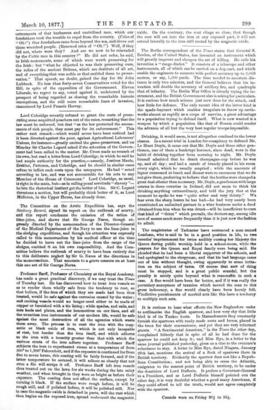Lord Coleridge recently refused to grant the costa of prose-
dating some acquitted poachers out of the rates, remarking that the law must be enforced, but that "as the law protected the amuse- riaents of rich people, they must pay for its enforcement." This rather rash remark—which would never have been noticed had it been directed against the poor, against Agricultural Labourers' Unions, for instance—greatly excited the game-preservers, and on Monday Sir Charles Legard asked if the attention of the Govern- ment had been called to the matter. Mr. Cross made no remark of hie own, but read a letter from Lord Coleridge, in which he said he had ample authority for the practice,—namely, Justices Made, Erskine, Patteson, and Coleridge, and he should in similar cases refuse to inflict such costs upon the ratepayers. He had "acted according to law, and was not accountable for his acts to any Member of the House of Commons." Lord Coleridge, as usual, iaright in the main, but—as in calling penal servitude "slavery "- heists the rhetorical instinct get the better of him. Sir C. Legard threatens a motion, but will probably think better of it, as Lord Midleton, in the Upper House, has already done.


































 Previous page
Previous page